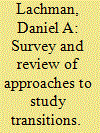| Srl | Item |
| 1 |
ID:
109356


|
|
|
|
|
| Publication |
2011.
|
| Summary/Abstract |
This paper formulates energy strategies for Suriname. A conceptual model, identifying relationships in the energy sector, is conceived. One of the striking characteristics is that various relationships inhibit significant uncertainty; our contemporary age is characterized by more complex becoming relations, decreasing predictability and increasing chaos. Simple extrapolation of past events is therefore futile, since deviations from anticipated outcomes have significant impacts.
The Scenario Planning methodology has been used to deal with this uncertainty. The most uncertain high-impact driving forces that shape the future of the energy sector in Suriname have been identified and are used to create energy scenarios to 2050. Next, robust strategies have been formulated which primarily focus on institutionalization, renewable resources, cost-reflecting tariffs, decentralization of energy supply, and energy efficiency and savings. Leading indicators have been identified that identify towards which scenario the present develops, and hence which set of strategies need to be applied.
|
|
|
|
|
|
|
|
|
|
|
|
|
|
|
|
| 2 |
ID:
122735


|
|
|
|
|
| Publication |
2013.
|
| Summary/Abstract |
With the aim to achieve a sustainable future, the field of transition studies has recently received increasing attention. Transition thinking and transition management have even been provided with a prominent spot in strategies and policies of a growing number of countries. However, though various approaches to study transitions (in particular, sustainability transitions) have been discussed and used in the past, an overview of these - with their advantages and disadvantages - has not been provided yet. Furthermore, linkages between these approaches have also not been provided in a single overview.
This article fills that gap in literature on transitions. It starts with the emergence of the "transition" concept and follows it to the notion of "sustainability transitions". Next, the article reviews approaches to study transitions. Thereafter, the paper provides some general criticism as well as strengths and contributions from transition research approaches to provide an impetus towards further research in this field.
|
|
|
|
|
|
|
|
|
|
|
|
|
|
|
|